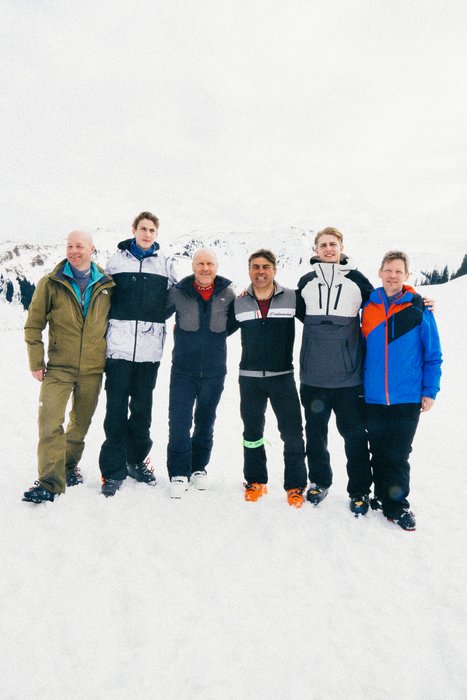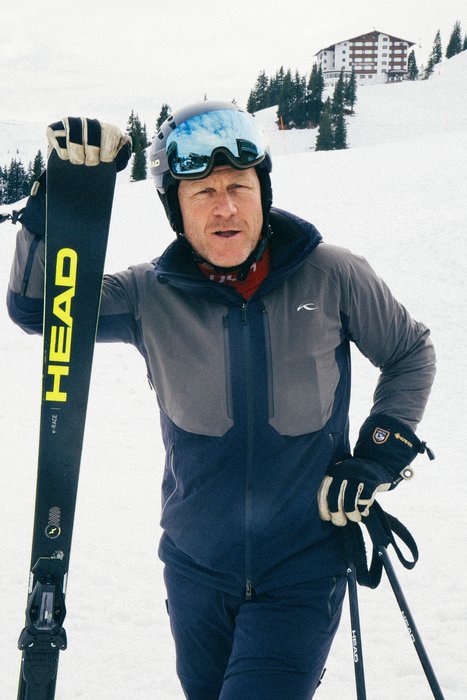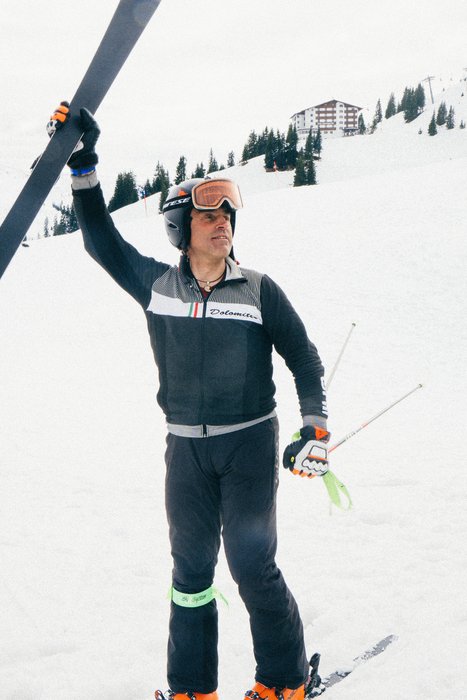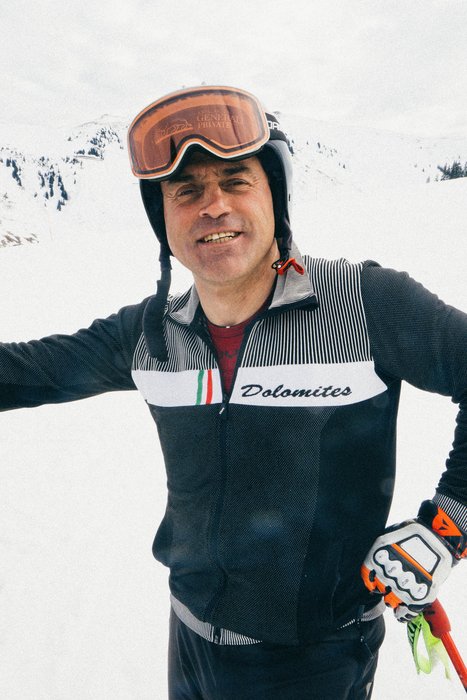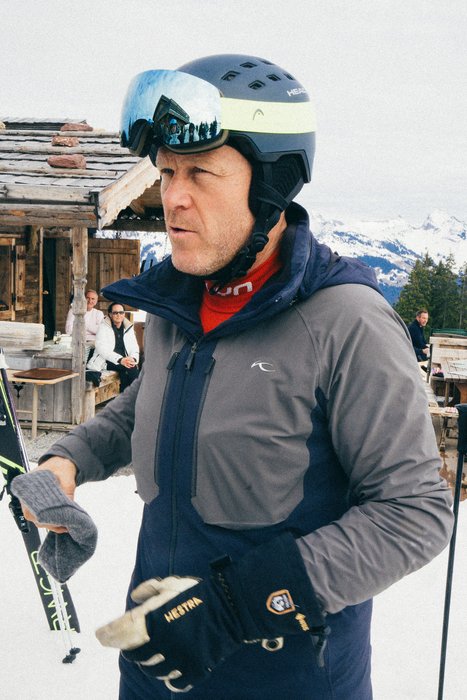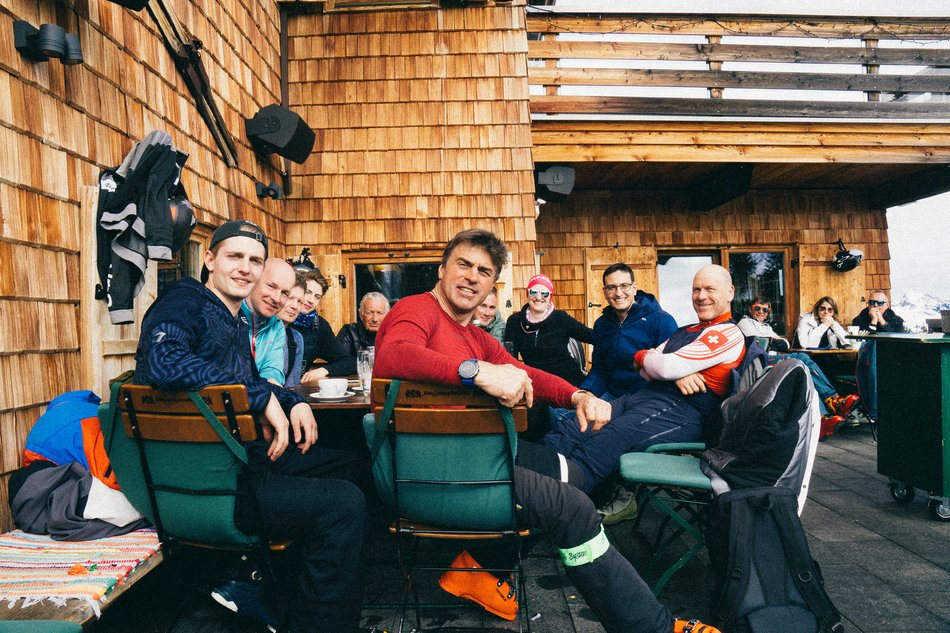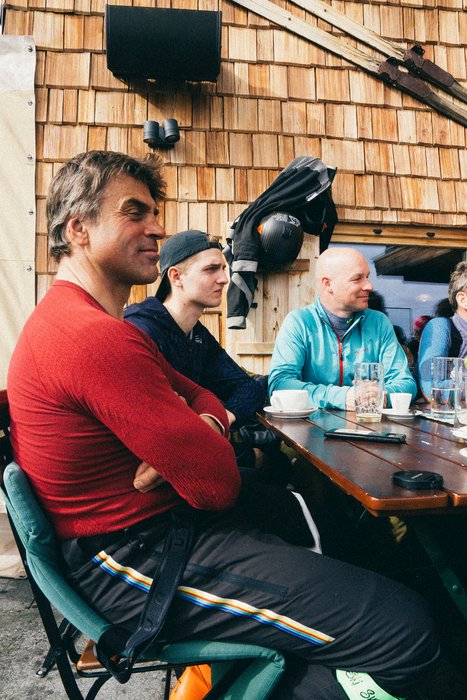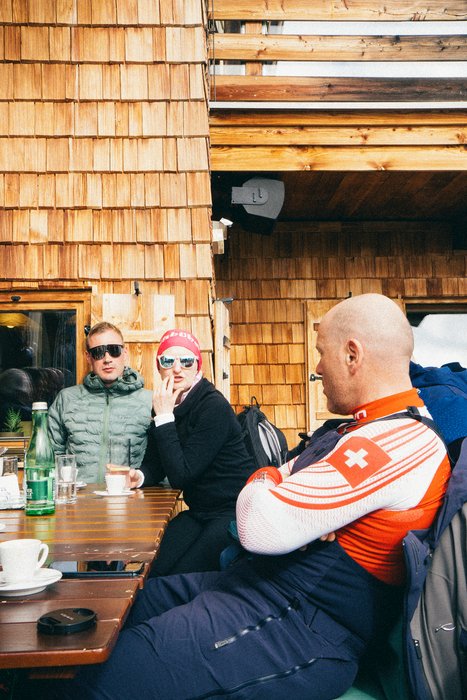Both of them have made history in Kitzbühel: Italian Kristian Ghedina in 2004 when he executed a split in the finish jump of the downhill race at 140 km/h. Swiss skier Didier Cuche holds the record with five wins (1998, 2008, 2010, 2011, 2012) on the Streif. Many years have passed since the end of their skiing careers. However, both of them keep returning to Kitzbühel and fondly recount their experiences. Preferably on skis. In gondolas, on lifts, during après-ski, and at special places, we found time to chat with them.
What makes the Kitzbühel ski area so special for you?
Ghedina: I've been here for skiing several times. I like it because it's a large ski area. Every time, you ski on a new slope. I've seen that there are also many new lifts. They are very nice. I believe that's your logo, right? The black and red with the chamois? It's everywhere. In the past, when I used to come to Kitzbühel more often, the lifts weren't like this. A lot has changed. There are also many 6- or 8-seater chairlifts. It's just a beautiful ski area, in my opinion.
Cuche: Yes, Kristian. You said you were here for the first time in 1990. I was here for the first time in 1996. That's almost 30 years ago. A lot has changed since then, definitely for the better.
Ghedina: Yes, here's another example: it's really funny. During my first Streif downhill run, I knew there was a starting house. Then they built a new one, and now I come back today and see a new starting house again, which they built about three years ago. Everything is new again: three starting houses that I've seen here so far.
Do you always wait for your own gondola at the Hahnenkammbahn?
Cuche: No. (laughs) But today, we missed my gondola by only three or four cabins.
Ghedina: Yes, but we could have waited for a few more cabins. We got into cabin number 87, right between our cabins: Cuche with number 83 and mine with number 90.
Cuche: In my last race, in 2012, it was a coincidence. When I was at the entrance, my gondola was the next one. I waited for it and went up with it. I saw it as a good luck sign for my last race. And that's how it turned out. Of course, it's a special honor to ride in your own gondola.
Ghedina: Yes, that's true. But unfortunately, in my gondola, there's only one victory written. If you get into Didier's gondola, there are many victories written here (laughs). Maybe I should take my skis again and go skiing.
How often do you come to Kitzbühel apart from the Hahnenkamm race weekend?
Ghedina: In the summer, I was invited once to a tennis tournament here. That was very nice. About 25 years ago, in the summer, I drove my private car all the way up to the Hahnenkamm start. I had to try many roads because I really wanted to get to the start. And somehow, I made it. That was funny. In the winter, I've been here a few times. Especially here, on the diagonal before the final stretch, I think it's incredible how the athletes do it. How can you go down this slope at such high speeds? I've skied it myself and even won. But today, I have to say, "These athletes are crazy! It's incredible!" It's difficult and different when you stand here and look at the course compared to skiing it as an athlete.
Cuche: It's been over eleven years for me since I last skied here. You can feel what it takes to go down this mountain and maybe even go fast. Overall, it's about the entire year of preparation. We're still fit, but it's not comparable to back then. It's impressive when you stand so close to the course. Even during training runs, it's an incredible experience when they zoom by. Yes, it's fascinating – although we did ski here. Back to the question: In the summer of 2015, I was here with my wife. She was pregnant at the time. We went to the Ellmauer Halt, the highest point on the Wilder Kaiser. We also did a lot of mountain biking. It was all very, very beautiful and convenient. This region offers a lot.
So, you wouldn't dare to compete in the Hahnenkamm downhill race today?
Cuche: Hmmm. With no training and no preparation, not a chance. But after a summer of training and with a measured risk in the race – maybe. But it wouldn't make sense.
Ghedina: Yes, you could go down in a crouch position, a bit low. But only up to the middle part, up to the Seidlalm – then, after the Seidlalm, it would get a bit difficult to go all the way down (laughs).
Do you have a favorite spot here in Kitzbühel?
Cuche: Yes, at the very top on the winner's podium. That's definitely the most beautiful place – with 25,000 people cheering for you. Right?
Ghedina: Haha, yes, absolutely.
Kitzbühel is known for its legendary parties during the Hahnenkamm races. Were you seen at any parties during your active years?
Cuche: Yes, but only after the race. Before the race, I always said – and I told other athletes too, including the next generation – that you have to experience a bit of this crazy, special atmosphere in the village and be around all those people. Just taking a walk through the town – unnoticed among the crowd, the guests, the stalls. You can refuel motivation with such an incredible atmosphere in the city.
Ghedina: I never did that. Neither before the race nor after the race – I've never been to the Londoner in my entire life, unlike Daron Rahlves or Luc Alphand. I don't like beer and I don't drink wine.
Cuche: Well, you can also drink water.
Ghedina: Haha, no, you can't have a party with water (laughs). My friends and my fan club came here a few times, and they celebrated a lot – even in the days before the race. When I had won, my friends told me that they hadn't even watched the race because they had drunk so much the day before that they only found out in the evening that I had won. Many times I skied the combined, and I can't party in the evening and then race the next day. In general, when I celebrate, I have to know that I have five to six days off afterwards. That's not possible in Kitzbühel. After that, you go straight to Garmisch. Athletes need to be disciplined.
Cuche: I didn't take it as seriously in Kitzbühel as Kristian did. In 1996, after my very first Streif downhill run, I went to the Londoner with Dani Mahrer, who won here in 1989, and I thought, "Wow – what a wild party!" But it was also a discreet party – wild but discreet. Okay, that's contradictory – wild but discreet – but at least when it comes to alcohol. A visit to the Londoner almost became a tradition for me. I always thought, "Okay, if you're healthy after Kitzbühel, you have to enjoy it a bit. Whether you're fast or not so fast." From 1998, I went to the Londoner almost every year after the race. That was the exception party in winter. Otherwise, I agree with Kristian, winter doesn't usually allow for it.
When you attend races today - how does it feel as a spectator, as opposed to back then, as a racer?
Ghedina: It's always nice here. Kitzbühel is simply a party. Until three or four years ago, I still had a strong desire to ski. When I stopped, I was 36 years old. I was the oldest back then, and everyone told me I was too old. So, I stopped because I was the oldest skier. But now, when I think about it... well, I still have a strong desire. Even for many years after my career ended, I always said I stopped too early. In my mind, I always wanted to start again (laughs). A comeback. But for the past three or four years, I've felt that my body can't handle it anymore.
Cuche: It took you quite a while to realize that you couldn't ski anymore. (laughs)
Ghedina: Yes, but then I saw Johan Clarey, who got on the podium at the age of 42.
Cuche: Yes, but Johan Clarey is 42. Four years ago, you were already in your early 50s, right?
Ghedina: Haha. Yes, but I only changed my mind when I turned 50.
Cuche: I've always known that Kristian Ghedina is a bit crazy.
Ghedina: Well, it's always nice to come here. This big party, this big celebration – everything is perfectly organized.
Cuche: Yes, Kitzbühel offers a lot. Since I retired, I've been traveling a lot with partners and customers of partners. A bit everywhere, but also in the VIP area. It's a place that athletes practically never get to. But now it has also become a tradition for the winners to be presented there on Saturday. That's a great thing: for the athletes, but also for the entire VIP area. It's an added bonus. Kitzbühel offers everything – for the VIPs, but also for everyone who comes to watch and enjoy this festive atmosphere. I think Kitzbühel can consider itself lucky that everything is the way it is. The mountain – such a crazy mountain that goes all the way down to the village. Railway line, roads – everything needed to celebrate a festival with an average of 60,000 people. It's great to see the other side of the sport. When you're active, you feel like the ski races are the reason to organize everything around them. But what always surprised me as an athlete was that the VIP stands were empty already after number 30. The spectacle continued! But now I know it's because of the timing of the whole program and the catering in the VIP area. And then there's the charity race. By the way, a great idea – to organize a charity race in this context. It's always a donation for the mountain farmers or the farmers in need. Everything is offered here, on top of everything else.
Do you miss anything from your professional careers?
Cuche: Well, Kristian mentioned that he almost regrets quitting so early. I have a healthy nostalgia when I watch ski races. I think it was a tough, athletic life, but it was really cool. When things weren't going well, it was even harder, but there were always races that worked out. I never regretted stopping. I was 38 when I retired. I knew I could continue to compete at the top for another year or two. But for me, the timing was right to stop. It's always nice to stop without injuries, with success, and when the decision happens spontaneously. But do I miss anything? Yes, the camaraderie within the team, the coming together of different countries and different athletes. I had affinities with different athletes – within the Swiss team and internationally. I got to know great people, not just athletes, but also coaches, service personnel, and organizers. You recognize a few faces everywhere, faces that have been there for so many years. Yes, it was a cool life, and you miss it from time to time, but it is what it is, and I never regretted stopping.
Ghedina: What I missed the most were the races and the feeling of racing. After I stopped, I did car racing for five or six years. Then I did a lot of motorcycle riding. Now I ride high-speed motorboats. I need that adrenaline, I need motivation.
Here's a funny story: Once, during a combination race here in Kitzbühel, I got disqualified after the downhill. So, I packed my things into my car and said I wanted to watch the second run of the slalom from home. There was no one on the road, so I drove really fast. I made it from Kitzbühel to Cortina in 1 hour and 40 minutes. That was a record! (laughs) And I actually watched the second run from home.
Cuche: I don't miss the adrenaline as much. I also did car racing for two years, with Audi on the race track. That was really cool and it was good to wean myself off skiing. But then it was enough. I also realize now that I don't need adrenaline.
If you had the chance to start as young athletes again today, would you do anything differently?
Ghedina: In general – yes, maybe I could have been a bit more professional. I had a bit of bad luck with my private car accident back then. It cost me four years. Well, not exactly "lost," but I had problems for four years trying to get back on the podium.
When you're in the lead and very famous, you often get invited to all sorts of events. You have to choose where it's right and important to go and where you don't need to go, using that time for training instead. As a pro, you have many appointments – it's also about money. If you go everywhere, you'll make money, but you'll lose a day of training. You always think you can make up for it and do conditioning training. In reality, you lose a day of training. I regret a bit that I gave more interest to these appointments than to my training. It's difficult to find a good path and decide where to go and what to do. You're young, and it would often be better if you had someone making these decisions for you. I had a manager. But managers make money with you and they tell you, "Yes, we'll go there." But you're also losing training and falling behind. If I could, I would do it differently today and focus more on conditioning training. In the last five to six years of my professional career, I told my ski association that we should work together more in the summer. When you have experience in the World Cup, it's better to do more and proper conditioning training than skiing. In the summer, when you go to the glaciers and spend ten days there, you might do two or three days of real training. Because the weather can be bad, training can be canceled, a few days go into travel, and so on. It's difficult in the summer. In our team, we only had a few conditioning training sessions. We could do much more in the summer.
Cuche: That's fascinating. I had a different setup. From 2001, I had my own conditioning coach. With him, I did 80-90% conditioning training, and I was practically always with him, rarely with the team. It certainly doesn't hurt to train with the team, but it's more specific the other way. If you want to work on your weaknesses, you need a conditioning plan that is specifically tailored to you. I never felt, especially from 2001 to the end, that there was much room for improvement with the whole training process. So, I had it set up very professionally and kept it that way until the end.
Ghedina: I say it's a shame for me. In the summer, we maybe had 70 days of skiing and conditioning training with the team. Out of these 70-80 days, 10% was conditioning training, and 90% was on skis. On the other days, when you're at home, we should have trained alone. But training alone is difficult. I already had a coach who made a plan for me, but I could decide for myself whether I did it or not. If you don't do it, you won't have the strength for the winter. And then there are all the appointments... Finding the right motivation when you're alone at home was really challenging.
Questions for Kristian Ghedina:
In 2004, a magical moment in skiing history: With a speed of 140 km/h and the famous split in the final jump, Kristian Ghedina was the fastest at 1.57.27. The final result: 6th place for Kristian Ghedina and 7th place for Didier Cuche. Now that you're sitting side by side, Kristian, how do you remember that race in Kitzbühel? With your split in the final jump, you definitely stole the show from the winner at the time, Stephan Eberharter.
Ghedina: Yes, I was asked after the race if I could stay for the awards ceremony because they had a special prize for me. Normally, only the top five are present at the official awards ceremony at the finish. I told them, "But I'm sixth, I won't be at the awards ceremony." "But we'd like you to stay; we have something for you." I had already packed up, because when you're sixth, you're not on the podium, and you're already thinking about the next race. But we decided, "Okay, we'll stay." I felt that the audience was really happy that I was there. I received more applause than Stephan Eberharter. Normally, it's the best thing for the audience when an Austrian wins here. Yes, I probably stole Eberharter's thunder a bit.
What do you remember most fondly?
Ghedina: My victory. Everyone might think it was my split. But the split was actually a bet with my cousin. I was happy that I had won the bet, but I was only sixth in that race. The first victory in Kitzbühel was something special. Until then, no Italian had won the Streif. It wasn't even my best race because the Streif isn't a downhill that suits me particularly well. Normally, I'm a glider. The Streif is more for technical skiers.
Cuche: I have to add something here: The bet was only for a pizza and a beer. (laughs)
How did your collaboration with UYN come about? What do you like about this brand?
Ghedina: I like the people and the boss. Marko Rhedini is a very energetic man. My collaboration started with ski underwear, and then they asked me if I wanted to make a contract for clothing as well. But I had another contract running, for two to three years. Then I said, "Yes, when I'm done, we can see if I'll also do the clothing with you." And yes, after a few years, I made a contract with UYN for both underwear and clothing. It's a nice company with a great team. I've been there in Asola a few times. UYN thinks about what's important, that everything is natural and organic, sustainable, moving away from plastic, and so on.
Questions for Didier Cuche:
Your last Hahnenkamm downhill race of your professional skiing career was quite special, wasn't it? You announced the end of your professional skiing career in 2012, just a few days before the Hahnenkamm races. Shortly thereafter, you crowned yourself the "King of the Streif" with your fifth victory in Kitzbühel. It must have been an emotional experience, right?
Cuche: I remember the whole process very well: Two days before the race, I announced that I would retire after the season. A week before, I didn't even know I would be quitting. I was in the finish area in Wengen, at the Lauberhorn, and I had a bad race. I wanted to be on the podium or win, actually. I had only been second there three times. So, I was in the finish, disappointed with my race, and after an hour, I realized that I was actually sad because I had realized that I would never stand at the Lauberhorn starting gate again. Then all the considerations started. First, I spoke with the conditioning coach. Then, on the way here, I informed the whole family. Finally, we set up the entire press communication. For me, it was clear that I wanted to make it public before the Hahnenkamm race because I didn't want to be dependent on the result on Saturday and then somehow change my mind about quitting and continue. And on Saturday, it wouldn't make sense to do any press communication anyway. There's a race, and there's so much going on. I didn't want to be in the finish and if I had won, think that I would continue, or if I hadn't won, think that I didn't want to end it that way, that I would come back. That's why I did it before the race. Overall, from the Saturday at Lauberhorn to the Saturday in Kitzbühel with the fifth win, it was an emotional roller coaster: disappointment, sadness, the realization that the winter was over, and then the official announcement before the race, and finally the victory on Saturday. If I could have written a script, I wouldn't have written it differently.
Media have said that your winning run in 2011 might have been the most impressive run in Streif's history. You left the audience in awe. What do you say to that?
Cuche: Yes, I have often read in the media that it's always a battle between Stephan Eberharter's run in 2004 and mine in 2011. It was definitely impressive. Considering that Eberharter had over a second lead at the finish. His body language and the way he skied were brilliant. I believe he retired after that. But afterward, after that season, I watched his race again and later, I was also inspired by Stephan's downhill. Especially from the Hausberg to the finish. He was so uncompromising there. I thought, there's no other way. It can't get any better or cheekier. And you could somehow sense from his body language that he wanted to win this. Maybe it was because he knew he wouldn't be skiing here anymore. I don't know, but yes, it's always nice when there are positive comments about that run from me. I certainly felt an inner joy.
How long did it take you to perfect the ski flip, and how did it come about?
Cuche: I came up with it in January 2002 in Adelboden. I had won with over a second lead. In the excitement at the finish, I opened the rear binding and I actually wanted to push the ski in front of me – and in the celebration, I kicked with my foot so hard that the ski did a flip. It was actually just by accident. (laughs) I only realized it two or three days later when I watched the video again. Then I practiced a few times without a camera. But it went relatively well relatively quickly, and then it became my trademark. At first, I only did it when I was fast, and then in the end, I realized that people expected it from me at the finish. They were calling for it. Fortunately, towards the end of my career, I was pretty consistent so I could always show it. It was a bit of a coincidence.
Ghedina: I tried it three times today too. The first time didn't go well, I lost the ski, but then it worked well on the third try.
In the old starting hut, there was a saying: "I think we're crazy to ski down there." Did that come from you?
Cuche: I'm certainly not the only one who thinks that. It's possible that I blurted out such a saying. But during my very first training run in 1996, four out of the first five skiers crashed, and three had to be airlifted with a helicopter. Something wasn't right at the Zielsprung. It took an incredibly long time before we started again, and I had bib number 40. I thought, "How am I going to survive this when the world's best are all crashing?'' It was not a good feeling for me to start. So, I started resignedly, then, with a detour like Bode Miller on the net, I came to the finish with an 8.5-second deficit. I was certainly the last, but after the finish line, I raised my arms like a winner. That was maybe my first success in Kitzbühel. When new members joined the team, it was a bit of a tradition that they had to hear this saying at the dinner the day before: "We hope you haven't unpacked too much because we don't want to have to pack everything up for you when you go to the hospital." I had to hear this saying, of course. There were loads of those sayings. But that one was a running joke in many nations.
![[Translate to EN:]](https://www.kitzbuehel.com/fileadmin/_processed_/b/1/csm_winter-in-kitzbuehel-landschaft-c-kitzbuehel-tourismus-9_3db83884ef.jpg)
